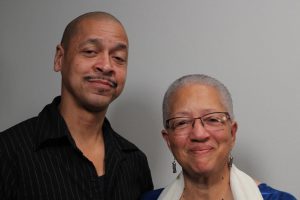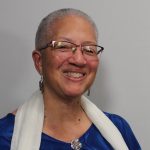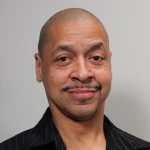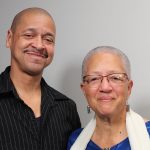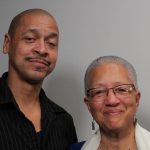Henrietta Andrews and Edward Hall
Description
Colleagues, Edward "Ed" Hall (57) and Henrietta Stiff Andrews (76), talk about Henrietta's life journey from an eight year old who contemplated suicide, to a young woman studying violin in South Dakota, and now, in her retirement, being on the Board of Directors for the Georgia Poetry Society.Subject Log / Time Code
Participants
- Henrietta Andrews
- Edward Hall
Recording Locations
Atlanta History CenterVenue / Recording Kit
Tier
Initiatives
Keywords
Subjects
People
Transcript
StoryCorps uses Google Cloud Speech-to-Text and Natural Language API to provide machine-generated transcripts. Transcripts have not been checked for accuracy and may contain errors. Learn more about our FAQs through our Help Center or do not hesitate to get in touch with us if you have any questions.
00:06 My name is at all. I am 57 years old. Today is Thursday September 20th, 2018 and I'm in the storycorps Atlanta Booth with my colleague Henrietta stiff and bruised. My name is Henrietta stiff Andrews. I'm 76 years old and today is Thursday, September 20th, 2018 and I am in the storycorps Atlanta with Ed Hall.
00:41 He and I are colleagues.
00:46 Henrietta, do you still live in Powder Springs?
00:52 I learned this from your book.
00:56 My short hair tells it all.
01:00 How long have you lived there?
01:02 Well, I moved to Atlanta in 2010 actually October 1st, 2010. I moved to Atlanta and in that move. I stayed with my daughter for about three months until December of that year that I moved into the house. I'm presently living in where were you before I was I was I retired from Ministry in Michigan I had
01:32 Been living in Michigan for 10 years as an associate conference minister with the Michigan Conference of the United Church of Christ and retired in 2008 and
01:48 By 2010 I had moved to, Georgia.
01:53 And where were you born in Warren, Ohio the little city it was the home of my father. I don't know much about it.
02:07 When I was younger when we were growing up, my dad used to put us in the car every so often and drive us to Warren to visit his sister by that point. I think his mother was already deceased. But yes, we would ride take a ride on a Sunday afternoon from Cleveland, Ohio to Warren and that's all I know about it. What was your what's your dad's name? My dad is Charles Charles stiff and your mother Josephine?
02:41 So
02:44 When did you first leave, Ohio?
02:47 I left I left Ohio on my own September 1960 when I took a Greyhound bus to Yankton College in South Dakota. That was a 27 hour ride. Yes, and you know in my book it there is a poem about that where my parents are standing outside on the platform of the Greyhound bus station and I'm on the bus and how I cried from Cleveland Ohio to Chicago. I managed to get myself together when we go to Chicago, but I I refer to those tears as the tears the Waters of my birth. What what what brought me into adulthood
03:41 So yes, I left home at age 18 to go to college and Yankton, South Dakota.
03:52 Why Yankton, South Dakota?
03:55 Well, you know In Those Days Inn in the sixties and in my high school class, there were a lot of people going to Ohio Schools, Ohio State and other colleges in Ohio in those days. I had such a yearling to be someplace where nobody knew who I was. It was like I instinctively needed a new start and there wasn't anything I was running away from it was more like I was running toward Freedom adulthood. Taking care of myself, and I didn't mind the idea of being so far away.
04:44 I know I said when I went to share that information with people over the years that there has been this kind of like you went to South Dakota. Yes. I went to South Dakota. I was in a college where there might have been about 375 of us and of the 375 to 400 students. There were about 25 of us persons of color.
05:11 I am my class. I was the only African-American woman. There was a woman there from Africa.
05:21 But I was not afraid of that.
05:26 I embraced that. Yes.
05:31 When you were younger before you left home, what did you think?
05:36 What do you think life would be like as an adult do you remember?
05:42 I had no idea except that. I had I made a commitment of a promise to myself from about age.
05:53 Can however that old I was that I would.
05:59 Embrace Life I would just live it at least the 25 age 25 cuz I want you don't see what it was. Like when I was I forgot I'd have to look at that poem again. But when I was a child, I contemplated suicide and well if I can find it that poem in this book at
06:26 I would have been just
06:31 Because I'm looking for it. I probably will not find it.
06:42 Okay, I'm not finding it and go for it. But okay, maybe eight years old. I thought I had decided that I was going to commit suicide so I was going to wait until my parents fell asleep that night and go into the kitchen and get the butcher knife and end it all and in my waiting for them to fall asleep. Of course, I fell asleep and when I woke up it was the next morning and I decided okay. No, I wouldn't try to do that again, but what but the deal I made with myself was to wait and
07:26 22525 seem like a long way away.
07:32 And to see what life would be like at 25 and when I got the 25, I remember that 20 of those years between 25 and 30 is that I did a lot of sighing and I was aware of that that the sign that I did the feeling that I had no purpose that I was just kind of wandering in life. I don't remember at age 25 thinking back to that time when I wanted to commit suicide and and realizing that hey you're there and it's not so bad. I didn't make that connection until
08:17 What I was almost in my seventies before I made that connection that you know, it had actually been okay.
08:27 Was there some?
08:31 I'm fascinated to know what?
08:40 At age 8
08:43 Would make you
08:46 Designer suicide
08:48 Any idea well
08:55 I wasn't.
08:57 As I wasn't unhappy
09:01 I was
09:07 I think I'm focused. I think one of the things that I've learned about myself is that I need focus and in those days when as a kid, it was really a question of of being part of a family that there was two six kids. I'm the oldest of six and a my parents and in the daily missal our lives and learning how to follow directions learning how to get along in the family learning how to make friends learning how to follow directions all of that. You know, that part of my life was kind of shaped for me, but there seems to be something that I wanted and I didn't quite know what that was.
09:57 And that might have attributed to the sense of loneliness that the other thing that I didn't know about myself back in those days was that I'm a Loner and while everybody else seemed to be always wanted to be in the company of other people always wanting to be involved. I was the one who sat in the in the living room with her ear up to the those old-fashioned radios, you know all by myself listening to those stories loving the fairy tales.
10:40 What reading I did in those days a loaner, you know, I play the violin I could be in that room by myself practicing I was okay by myself, but I think I may have also not realize that being by yourself is okay. I think I might have been feeling like there was something missing and I remember even in my early Twenties that you know, that that it was there again after I had finished college and I had a job is like, okay now what what do you do with your life?
11:23 And and sometimes I would get in my car in Cleveland and I would ride to Pittsburgh all by myself on a Saturday. I had found this little shop that's sold designer clothes and I could afford to go in there and buy an outfit that I knew and it nobody else was going to be wearing it because I had to go all the way to Pittsburgh and they got their clothes from someplace else New York, I think.
11:55 But when I was in my my twenties, do you know there again by myself?
12:02 And sighing a lot
12:06 And thinking that there was something missing but I didn't know what it was.
12:13 Were you writing poetry at that time? But I was writing I began keeping a journal when I was about 14 or 15 years old.
12:30 And it began because my we had we had a family come to visit us, you know teenager. So I'm the oldest and next to me is my sister Carolyn and then the two brothers and then two younger sisters. So when this family comes to visit they have sons who are the age of myself and my sister and those young men paid more attention to my sister then they paid to me and I think that was the beginning of being introspective, you know, like so what's wrong with me. So I remember writing a letter to myself
13:16 An essentially in that letter. I was it's like, you know, so what is it about yourself?
13:25 That needs to be understood and I put that letter I put it in an envelope and sealed it then the idea of the plan was to open it up a year later to see if I had changed as a person. I don't ever remember ever opening it.
13:51 I don't remember that but the fact that fish but that was the beginning of keeping a diary. So I would write about things that were happening in my life.
14:05 But what you and what was it? They my answering the question. Isn't that you're okay. I guess I should also ask. Is there any when you correspond with do you still write letters or were you ever a letter writer to other people other people because I was always
14:29 Not comfortable with my own writing and my ability to spell words, you know, and it's taken me until I was retired before I understood that there are a lot of us who cannot spell but I never paid attention that I was only thinking about the fact that I know I can't spell so I would not write letters easily. I like to talk on the phone. I like face-to-face conversations and sold and eat for today that it's like what 60 60 60 something years. I've been journaling now and when I Journal I just right if I think I've misspelled the word i Circle it and I've kept all my journals knowing full. Well this Sunday in the my kids may be going through that and Enzo.
15:29 Call Mom couldn't spell.
15:33 But the ideas and the feelings of the observations and all of that is in there.
15:42 But to write letters know I just I thought to ask one because you mentioned writing letter to yourself. There's that old song, you know, there's a famous Fats Waller version going to sit right down and write myself a letter but also I just mailed a letter on my way here and you actually know the recipient. Were you at the I guess the Athens should you go to the Athens meeting of the Georgia poetry Society? I think so because I have no I can remember where I first saw the word Gestalt, but I can't remember the past is a blur to me. So I have large semantic memory and light must like my sister and like my sister. I terrible semantic memories sequential memory. So the past, you know, once I get the past about a week, it's like
16:42 Month ago was that but who who died pooping out with I remember in exiguous to tail, but real life to me is
16:57 I should keep a journal I should keep a diary but I don't and I really need to cuz I do not remember stuff and I don't remember faces and it's it's not uncommon among writers. It's just took me to adulthood to learn how my brain actually works on remember actually works but
17:19 I want to go back to the radio. Okay, what shows did you listen to cuz I was I was a fan of the first of the old time radio cuz my I had depression Survivor parents and they grew up listening to that stuff. And then there was a Reviving a relay end in there was a Revival of in the 70s. So I thought it was a CBS Radio Mystery Theater and I would listen to that every Saturday night with my dad.
17:44 Well, my listening was was mostly solo. I don't remember that anybody else came to sit and listen with me. But I remember on Saturday mornings. I would sit and listen to fairy tales that that were red. I think they were read a few years later. It would be Saturday evening those Mysteries pay. Yes, and I used to do that. I mean, I just I have a memory of City. We have one of those old-fashioned radios super effort on what you know that look like a piece of furniture that I didn't know. That's what they call them. Okay? Why is this sit?
18:38 Write up, you know, like right with my ear to that thing listening to it. And I did that until the day it caught fire. That would be a good disincentive. My dad didn't replace it. He didn't fix it. It was just gone and it's so it was a big piece. I don't know what I did in place of that but that was an activity that I do clearly remember that and it was and I don't remember anybody else sitting with me.
19:18 And so what year is that that you start journaling?
19:22 How old are you? How was about 15 mocha 14, so that would have been like 1957. Okay.
19:33 And
19:34 You weren't you weren't writing poetry. Then were you making art we look in your heart then I wasn't but when I thought back over the
19:50 You know, you have to ask yourself. Why you remember certain things what I remember about art?
20:02 Is that in the kindergarten class? I know it was a kindergarten class the teacher had to spend some time with some parents one day. So she hastily gave everybody one piece of paper and one crayon and then she said draw a scribble fish.
20:23 Now
20:25 What I would I remember that and I have often asked myself. Why have I remembered that?
20:34 It bothers me that she gave us one piece of paper one crayon and then told us what to draw and I think I wanted the freedom to draw whatever I wanted to draw and that's the first thing about art that I remember in fourth grade the we were studying a unit on American Indians and
21:01 We had clay so each person in the class shaped this clay. I had a bowl. I remember it was a bowl near the end of the week when those objects were drawn by the teacher gathered us a small groups at the back of the classroom so that we could paint them and I remember she said who would like red and my hair and flew up who would like yellow my hand went up who would like green my hand went up and I remember thinking to myself. Why do I need all those colors?
21:38 Junior high school art class. We were given a large piece of contact into a what do you call that kind of paper, Okay a large sheet of it each person in the class had their own pegboard. We had our own piece of tagboard we could design on that on that table or whatever we want wanted and I remember drawing three abstract fish. That's filled that tag board with all these colors.
22:15 And
22:17 And it didn't there was no arguing with myself. I it was something I just did so when it
22:27 The Arts thing the interest in our the interest in abstract, I think has always been there and the evidence of it. Is this you know that
22:45 Before I retired I found my way to Art because I realized that if I was going to retire successfully I needed to have something that I need is a cultivated interest outside of what I did for work. Otherwise, I I felt retirement retiree was going to be difficult. So I found myself drawing making these little drawings just a lot of little drawing until about
23:20 Sam moved here in 2010. So about 2013. I met an artist who saw my little drawings and she said why not try something large. So one night. I sat down with a raggedy piece of pegboard and I started drawing.
23:42 And the the end result of it was I couldn't then throw it away the plan had been to just you know, I just didn't tear it up and throw it away, but I could cuz that's the artwork on the front of my book is the result of the first thing that you re so what I learned about myself an art is it has always been there. The interest has always been there. I've never taken an art class outside of the one class that I took in college and the classes that my sister and I used to go to the Cleveland Institute of Art.
24:24 The museum they used to offer classes for students and we went there. So I have no formal education is and if you give me a paper and pencil or whatever invariably what I'm going to do is something abstract. I know you also you attach cloth.
24:51 To at least some of your work including this one on the cover of of the book. There's just that one little piece of cloth in their fabric, but I love working with fabric. I've created quilts and what and when I create the quills, I don't follow rules.
25:15 I did a quilter would probably look at what I do and say she has broken every rule but I want the quilts to look like somebody sat down and made them by hand. And when I make the quilts, I don't go out and find going by material. I use what I have at home and I don't make them symmetrical or even or who are there. I just put pieces in wherever I think I just have fun with him.
25:55 I love that.
26:01 Tell me about the story behind the poem The launching of Henrietta.
26:08 The launching of Henrietta. Oh, that's okay. My mother was one who believes that we should be able to take care of ourselves and that meant
26:24 Being able to make decisions.
26:29 This is why can't I find anything?
26:40 The closer to the front or the back
26:46 It should we go here it is 85.
26:51 Okay, so
26:55 Okay. Well, here's this poem. I stood before her with a question and address in each hand. She was busy with some tasks and a decision needed to be made. It was a school day and at age seven or eight the answer to my question came from her. So there I stood waiting which dress shall I wear this one holding up my left hand wear this one holding up my right. I noticed that she never looked up never looked at me and she said that one.
27:32 When I read that poem to the one of my younger sisters, she said mommy did that to me too, and I got mad.
27:42 But I thought
27:44 When this happened that day that is half, but I realize that what my mother wanted was for me to make the decision and and yes to the launching and there were there were other ways in which they did that today to encourage me to be independent. Like when we sold Girl Scout cookies la I would have preferred if my parents got on the phone and call their friends and said, you know Henrietta selling brownies cookies for the Girl Scouts. Would you like and no my dad said here's what you say. So he told me exactly what to say and how to say it in was it would you like to buy a box of cookies? But how many
28:35 So, you know the vet their whole this is why going to school in South Dakota from you was not a surprise. I feel that it was hard for them because I was the first one leaving the nest but they had been teaching me that all along how to make decisions how how to be an independent person.
29:02 What were you intending to study in South Dakota with my violin and tow the trunk and a suitcase and my bag and my violin so I majored in in violin and
29:25 You know and I know this sounds funny. I decided to major in Violin because I liked the instrument I liked music and I thought that I could be successful in college with music if I studied music it wasn't until recently that I realized that that's not easy music is not easy. But you know, but that was my choice that that was the way I planned to get through college was with music. Do you still play?
30:05 Know that I have a piano at home. I have the piano that my mother got used to me I go to it. I don't tell people that I played because I'm often so embarrassed by that. I love music the instruments that I had I gave away at one point because someone came through
30:27 Saying that they needed instruments for kids under one of the islands and I had two violins at that point the violin that I used it College in the violin that I inherited from my husband's father. It was his violin I gave them so I don't have the only time I get to play now is if I go to somebody's house and their kid is studying the violin in and I need someone there.
30:59 So I interrupted my own story about the letter the recipient of the letter that I mailed was hope will be Nathan trippy who did the presentation in Athens on Depo the that French School of avant-garde poetry Nathanson old and he's an old friend and sent me a copy of his latest volume of his ongoing project the Balvenie ad so I sent him a thank-you letter.
31:36 But subject to Circle back around to Georgia poetry Society. How long have you been a member? And how did you how did you get tied up with these disreputable poets?
31:53 I think it was because I had been asked to preach at First Congregational Church here in Atlantic one Sunday and there I think there was something about the way I delivered that sermon. They caused Ira Harrison who's a member of the church and also a member of Georgia poetry to extend an invitation to me first to be part of the local what we call the Southwest poetry group and then that led to becoming a member of Georgia poetry.
32:33 But I Harrison who is a poet who was published quite a bit number of books. He there was something he recognized that caused him to extend that invitation.
32:51 And what is your what's your role in the organization these days?
32:57 Right now, I'm the Registrar on I'm the one who manages that table and a member of the board of directors. And and how did that come to be? I mean did you did they draft you immediately? I know how am I not what my mind on profit experiences here you get you get in and next thing, you know, it's like oh would you be so
33:22 Know what happened know is it's it it came about after many years of of being part of that group.
33:35 I think probably because Ira was the one who asked me if I would hit he wanted me to be the historian.
33:45 Oh, and I said, yes because you don't say no tonight, but it's not a response and area of responsibility that I feel good about. I've just not knowing what to do with with that roll. But I think that led to the that had me serving on the board as a
34:17 He got an invitation when I said yes to the historian piece that got me to the board table. And I think that's when people got to know me a little bit better in and then it led to the invitation to be the registrar. So it's been it it's at this come about slowly it it wasn't.
34:48 It has helped that people over a number of years now have had an opportunity to get to know me and I haven't had a chance to get to know them that that's how it has come about in.
35:04 So how long ago was this that IRA?
35:08 Brought you into the fold he was home. So that would be about 5 years ago.
35:26 What's been your favorite though? Have you give a favorite event or function or?
35:35 Thing that has happened through
35:38 Georgia poetry or the something that that the organization does on a regular basis that you especially enjoy what you want to see around.
35:47 What do you like best about your involvement?
35:51 What I most appreciate going when I when we have our quarterly meetings, I appreciate the presenters. The presenters are often professors from various colleges who are teaching English and poetry is one of the subjects that they teach when they come in and they actually introduced us to some new way of thinking of a way to approach writing a way to
36:28 Be able to analyze not analyze.
36:36 Different ways to think about how to approach writing. I think that that's that is why I go for that moment of being introduced to a way of thinking about poetry that I could not do on my own.
36:58 And
37:00 What are your hopes for the organization?
37:04 I think like many of the members in in the organization. My Hope Is that we can find a way to attract other poets to that group so that when we have a quarterly meetings that there is something
37:25 Some energy that is there that that will cause people to want to come back every so often new people will come but they don't come back and in
37:38 An In-N-Out perhaps one of the reasons is
37:43 People in groups like at church are generally shy people and we don't do a good job of welcoming new people.
37:58 We allow them to sit at a table by themselves to have their lunch by themselves. We don't go up and introduce ourselves. We just don't do that and soul people come they experience us and then they don't come back. So my hope is that with the energy that the board is trying to
38:23 Focus on how to improve the way we present ourselves so that others will want to come and be part of that group.
38:38 Circle back to you for last question
38:43 What are you proudest of how do you want to be remembered?
38:47 Oh, I don't want to be remembered.
38:53 Oh gosh.
39:01 I think I would like to be remembered as the person who was willing to.
39:10 That that I was trying to live my life everyday of my life and not in in a place of safety, but very often going to the edge and maybe over the edge once in awhile and not crazy over the edge just to the edge.
39:35 How would I want to be remembered? Wow?
39:41 And some I don't know.
39:45 That's a good question.
39:51 But hopefully was somebody who like to have conversation maybe.
